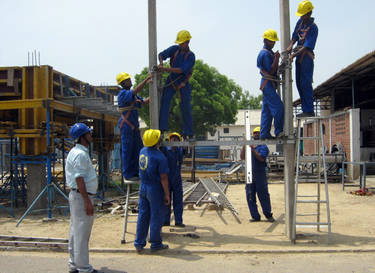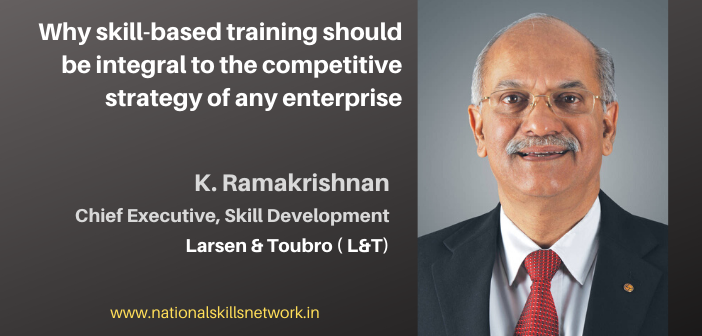L&T has always believed in investing in training their workforce through various skilling programs. In this Skill Talk, Mr. K. Ramakrishnan, Chief Executive, Skill Development Mission, L&T shares his views on current focus on skilling in India and exhorts the industry to make skill development an integral part of their competitive strategy. Mr. Ramakrishnan works closely with Mr. A. M. Naik, Chairman, NSDC and Group Chairman, L&T in implementing his vision for Skill India. Let’s read on…
Q: As a conglomerate, L&T has always considered holistic perspective in skill development. Could you tell us the ways in which L&T is achieving it?
A: L&T has always believed that good training is the key to success of any organisation, more so, the need to skill blue-collar workforce and show them a career path. From early 50s and 60s in our major manufacturing facilities in Mumbai and Hazira, we used to proactively train people from ITIs before the actual manufacturing started. This is because a well-trained, efficient, productive workforce is the key to the success of any organisation.
 We have training facilities in all our manufacturing locations. We believe training is a continuous process. We have initiatives for training of manpower in the construction sector with the establishment of 8 CSTIs (Construction Skill Training Institute). We train approximately 8000 people annually in key skills like barbending, carpentry, formwork, tiling, masonry etc.
We have training facilities in all our manufacturing locations. We believe training is a continuous process. We have initiatives for training of manpower in the construction sector with the establishment of 8 CSTIs (Construction Skill Training Institute). We train approximately 8000 people annually in key skills like barbending, carpentry, formwork, tiling, masonry etc.
Our training is holistic in the sense that apart from the domain skills we also focus on safety, and quality which in turn leads to enhanced productivity. We have embedded these aspects into the training at various centres where we have create the requisite infrastructure to carry this out in a sustainable manner.
Related article: L&T transforms the lives of youth through Construction Skills Training Institutes (CSTIs) across India – Read more: https://nationalskillsnetwork.in/transforms-lives-of-youth-through-construction-skills-training-institutes-cstis/
Q: As skilling and training are mostly taking place in the sectors of construction and heavy engineering industries, is there a way this approach can be brought down to smaller industries?
There is a very big need for imbibing the culture of skilling across industries. Moreover, skilling and training is not easy, as it involves a lot of money, human resources and infrastructure to build a robust skilling ecosystem. However, we need to understand that skill training is actually an investment that pays back much more over a period of time. It helps us in becoming more competitive and therefore helps in the growth of the business. Hence we need to have have patience, commitment and the belief that good training can be rewarding in the long run.
As an EPC organisation we also work with a lot of subcontractors. We have tried to emphasise the importance of quality, safety and productivity in their workforce skilling initiatives.
 Q: Though the awareness creation on skilling has started, there are still some initial hiccups and hurdles. Is there a plan of action that you created to prepare with this and make it really effective?
Q: Though the awareness creation on skilling has started, there are still some initial hiccups and hurdles. Is there a plan of action that you created to prepare with this and make it really effective?
A: The key factors that need to be focussed on are enhancement of Quality of Trainers ,Quality of Training and making the training/skilling a more demand driven non prescriptive initiative. The NSDC team is working on these areas under the guidance of the Ministry of Skill Development and Entrepreneurship.Some of the initiatives being taken are:
- Development of a Training of Trainers Programme in collaboration with Singapore Polytechnic
- Initiating pilot programmes for demand driven cluster based training
- Driving initiatives to scale up RPL (Recognition of Prior Learning) and ramp up enrolment in the Industry friendly and flexible NAPS (National Apprenticeship Promotion Scheme)
Q: What are some of the current initiatives of L&T in training and training of trainers?
 A: As mentioned above there is a need to enhance the quality of trainers. L&T is planning to set up a Training of Trainer Institute in Mumbai to train the trainers in the skilling ecosystem. This programme will be affiliated to the NSDC – Singapore Polytechnic initiative to develop a curriculum for Training of Trainer. The programme consists of a 10-day classroom training which predominantly focuses on platform skills, followed by 15-week on-the-job training.A pilot TOT programme has already been conducted in July 2019 and the second pilot is being rolled out next week.We are covering 4 sectors in these 2 pilots namely Construction ,BFSI ,Capital Goods and Electronics
A: As mentioned above there is a need to enhance the quality of trainers. L&T is planning to set up a Training of Trainer Institute in Mumbai to train the trainers in the skilling ecosystem. This programme will be affiliated to the NSDC – Singapore Polytechnic initiative to develop a curriculum for Training of Trainer. The programme consists of a 10-day classroom training which predominantly focuses on platform skills, followed by 15-week on-the-job training.A pilot TOT programme has already been conducted in July 2019 and the second pilot is being rolled out next week.We are covering 4 sectors in these 2 pilots namely Construction ,BFSI ,Capital Goods and Electronics
Though we are following Singapore’s Polytechnic Curriculum, we have also added some learnings from our own experience of training thousands of people over the years. For example, in the pilot, we included yoga classes, team building and sports sessions. This helps the trainers in understanding the importance of holistic development. They realise the importance of taking care of health, thinking outside the box and in finding innovative solutions. The whole idea was to add as much value to the training program as possible. This helps the trainers to be more motivated and add value to their training sessions subsequently.
Q: Today, the whole approach towards skilling mainly focusses at blue-collar or entry level jobs. What needs to be done for the approach of skilling to gain momentum to all the levels?
A: Today, most skilling programs are aimed at youth who are unable to pursue higher education like diploma and graduate programmes.Gradually we are moving towards higher level skilling. National Skill Development Corporation (NSDC) and Ministry of Skill Development and Entrepreneurship (MSDE) are taking new initiatives like setting up of Indian Institute of Skilling , helping setting up of Skills Universities and introducing vocational subjects at school level
These are some strong indicators to show that skilling is moving from blue-collar jobs to white collar, supervisory and managerial jobs. Our goal is to make people more job-ready and employable. It should make any student from be it an ITI, or polytechnic diploma holder, engineering graduate more adaptable and more ready to do the job that industry demands.
Recent MoU signed with the Government of Germany is one such example. Germany has developed a model with focus on vocational training, this made it one of the industrial powers after the World War II.
Your message to the training providers and industries in the skilling ecosystem
Focus on quality, productivity, safety, and make sure you impart demand – driven training. If the link between demand and training becomes strong, it leads to higher employment and this will be a win-win for employers and potential employees.












